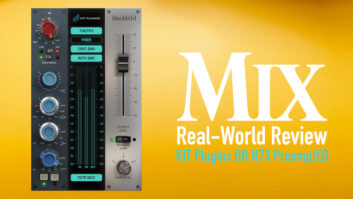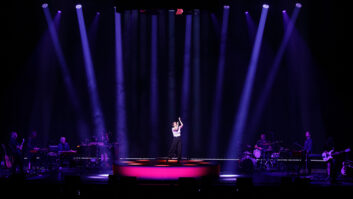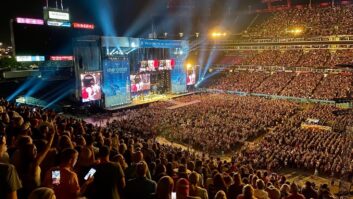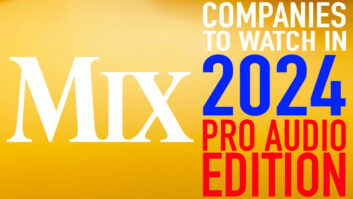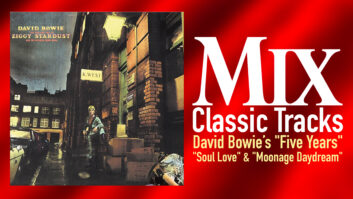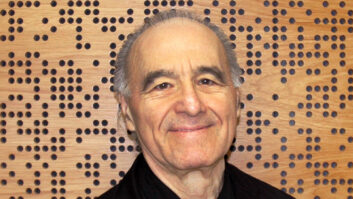The ups and downs of Nashville’s music industry have beenwell-documented in these pages over the years. The link between thecity’s recording studio infrastructure and the country music industryhas proven a double-edged sword, bringing good times in the early 1990sas country music’s market share doubled to more than 18% of a $12billion music industry. Facilities proliferated in the wake of thegenre’s expansion. The inevitable contraction came, starting in 1995,though by the time a downward trend could be discerned, the studio basehad become considerably overbuilt.
According to the most recent analysis by Nashville-based industrytrade publication Music Row magazine, 53% of studio revenuesat responding Nashville facilities come from country music,surprisingly higher than in years before. But, at the same time, thegenre’s sales have plummeted by half since a highwater mark in 1995, to8.5% of retail record sales in 2000, according to SoundScan. That hascontributed significantly to the lowest reported rate of studio revenuegrowth since the magazine started tabulating data in 1994: 10% in 2000,down from 26% in 1994. Not bad for many types of businesses, but forhigh-end studios, that’s often not enough to cover the increased costsof new equipment and renovations.
Since mid-decade, consolidation has been the name of the game. Majorlabels, including Arista and Atlantic, closed shop; publishers merged;and studios, including some of Nashville’s longtime anchors, followedsuit, some being acquired by other facilities, some simply closing. Itdidn’t help that country music’s decline took place during an evenwider period of disruption in the entertainment business. Some alsohave questioned the creative decisions of Nashville’s music businessbrain trust, which historically has given credence to the notion thatimitation is the sincerest form of profitability. Country labels havechurned out Dixie Chicks knock-offs and anonymous handsome hat acts,with generally dismal results. Tony Brown, president of MCA Nashville,and one of country music’s most successful record producers, candidlytold attendees at the annual South by Southwest music conference inAustin, Texas, in March, “For me, in Nashville our music istotally boring, and I’m partly responsible.”
However, many positives are on Nashville’s side. These includeinnovative responses to a changing market by major studio facilities;the fact that the Nashville area is also the center of the fast-growingcontemporary Christian/gospel music market; and a burgeoning alt-musicscene that would welcome the de-linking of the city’s name with countrymusic’s fortunes.
CHANGING WITH THE TIMES
Many of Nashville’s anchor facilities have become more creative inreacting to changes in the business landscape. Emerald Recording, forinstance, grew via acquisition, most notably with the purchase of theMasterfonics facility after the latter declared bankruptcy two yearsago. Emerald CEO Dale Moore explains his desire to create a fullyintegrated vertical business structure, from preproduction throughmastering, and at various budget levels.
Other facilities and engineers have established themselves asspecialists in specific fields, such as Seventeen Grand Recording andNashville engineer Chuck Ainlay in the multichannel surround musicmarket. Though Seventeen Grand co-owner and mixer Jake Nicely concedesthat multichannel audio is still in the starting gate as a revenuesource, he notes that the attention brings a significant value of itsown in marketing and promoting the studio. “Along with Chuck,we’ve helped make Nashville a major center for surround music,”he says.
Strategic alliances and new services are part of Sound StageStudio’s strategy. Studio manager Michael Koreiba notes that thesix-studio facility recently added a large dedicated Pro Tools system,along with three smaller rigs that float throughout the complex. SoundStage also opened a new format transfer service on site. “Whatwe’re doing is looking for other legs to stand on,” Koreibaexplains. “It’s about diversification, and it’s definitely ashift in strategy, because if you just sit back, you’re going to getrun over.”
Sound Kitchen owners John and Dino Elefante used geography as adefining strategic element. They situated their multi-studio facilityin prosperous, suburban Williamson County, where many of Nashville’smore successful artists and producers have migrated. “There areproducers and artists who have their own home studios, which we’veencouraged and helped them build,” says Dino Elefante, pointingto producer Michael Omartian and country artist Steve Wariner as twoexamples. “We want them to start their projects at home, andoverdub them at home, and then come here to track and mix. And that’swhat’s been happening.”
A TRULY FAITH-BASED INITIATIVE
The contemporary Christian/gospel music market is growing and hasemerged as a significant force in music recording in the Nashvillearea. Some in the studio business go so far as to speculate that thegenre could supplant country as Nashville’s core music type. If thathappens, though, it will take place less on Music Row and more in thesprawling Franklin and Cool Springs suburbs to the south.
“It wouldn’t surprise me at all,” says Jeff Baggett,owner of Franklin Mastering, one of a number of studios in the areathat rely on contemporary Christian and gospel for the majority oftheir revenues. “As a genre, Christian has nowhere to go but upover the long term. And what I especially like about that music is thatthe younger, edgier bands and artists are starting to make thetraditional Christian music industry take notice. Indie [Christian]labels like Inpop are really putting a bang in the music. Indie labelsracked up a lot of wins at the Dove Awards this year, too, and thattells you that the youth end of that market is stillgrowing.”
The numbers on contemporary Christian and gospel music do look good.Last year’s slight downturn in Christian music sales — 44 millionunits sold vs. nearly 48 million in 1999, according to SoundScan— was the first slip after five straight years of growth. TheGospel Music Association, which is based in Nashville, attributed thedrop in sales to a coincidental lack of new studio records from thestars of the genre, such as dc Talk, Jars of Clay, Steven CurtisChapman, Sixpence None the Richer, Amy Grant and Point of Grace.However, many of those artists have new releases scheduled or alreadyout for this year, and several, including Amy Grant and Sixpence, havepenetrated the pop market, fueling the genre’s sales. (Sales are likelymuch higher than the SoundScan numbers, as is the case with many nichegenres, where many sales are non-retail. In the case of Christianmusic, many recording artists also have ministries that sell theirCDs.)
Other harbingers of growth: Christian music video sales experiencedan 11% increase in 2000 over 1999; contemporary Christian and gospelmusic saw a record number of RIAA Gold, Platinum and multi-Platinumcertifications, 25 in all; and the broader Christian entertainmentindustry continues to gain larger shares of other media, most notablythe “Left Behind” series of End Time-themed novels, whichhave not only made best-seller lists but have also spawned featurefilms. Finally, Christian/gospel music is not a Deep South phenomenonanymore; the GMA’s list of Top 10 markets for the music is telling:ranked in order, they are New York, Los Angeles, Chicago, San FranciscoBay Area, Philadelphia, Boston, Washington, D.C., Atlanta, Detroit andDallas-Fort Worth.
What this all means for Nashville-area studios is a steadily growingbase of music clients. But there are asterisks. First, Christian andgospel music have migrated to the suburbs; of Music Row facilities arenot the primary beneficiaries. Omnisound Recording, a veteran facilityoff of Music Row, had more than half of its revenues coming fromChristian and gospel as recently as five years ago. “Now I can’tremember the last Christian artist we had in here,” says studioco-owner and manager Steve Tveit. “When studios in WilliamsonCounty, like Sound Kitchen and Dark Horse, started opening up andexpanding about five years ago, the Christian work on Music Row droppedlike a rock.” Also, Tveit adds, Christian artists and producerswere ahead of the curve in project and home recording, whichcontributed to their exodus from the Row. “You would talk to thecartage guys and the musicians, and you’d see that that work was goinginto people’s homes in the suburbs,” he says.
That trend actually provoked a showdown between the Nashville A. F.of M. musician’s local and Christian record labels two years ago, whenthe union demanded that Christian labels become signatories to thestandard recording contract, prompted in part by the increasing amountof below-scale sessions on Christian records. Ultimately, the labels— including Nashville-based Word Records, which has a commanding57% of the Christian music market — agreed, but not before astand-off that noticeably slowed the flow of Christian record work intoall studios for a period of about six months. That likely droveChristian recording sessions further into suburbia, speculates DarkHorse Recording studio manager Ed Simonton. “We did feel it; Ithink we all felt it, because so much of our work comes from thatmarket,” he says, estimating it as high as 80%.
George Cumbee, owner of Classic Recording in suburban Franklin, saysstudio rates for Christian sessions have been able to hold reasonablysteady over time. There are a few factors to note in this regard; asidefrom the overall growth of the industry, Christian/gospel’s continuingpenetration in pop markets has brought a new emphasis on qualityrecording, he says. Also, studios don’t need to invest in the mostexpensive equipment to be competitive and attractive to Christianartists. “They’re not making their studio decisions based onconsole ‘wow’ factors,” says Cumbee, whose studio hasa DDA Mark 24 console supported by 30 years’ worth of vintage outboardgear and microphones. Also, budgets for Christian records are growingwhile those of pop records are shrinking. Studio owners are reportingbudgets topping $100,000 for larger-selling Christian artists; paltryby pop standards, but at least they’re on the rise.
The bottom line is that the Nashville area, if not Nashville itself,is now regarded as the undisputed home of the genre. “This areahas definitely become the national home of Christian music recording,just like Nashville had become the home of country music,” saysCumbee. “I don’t think there’s any other place on Earth where somuch Christian music is recorded.”
NEW FACES
Country’s recession is also opening more space for other musicgenres to develop, including rock, alt and jazz. Two jazz labels,Hillsboro Jazz and Eminent Records, opened in the city recently, bothwith acclaimed initial releases. The region has also spawned successfulnational alt-rock labels, such as Spongebath Records in Murfreesboro.These start-ups and their artists are looking for studios that fit boththeir budgets and their vibe.
Interzone is typical of the aspirations and mind-set of many inNashville’s next studio generation. Located in a turn-of-the-19thcentury house, the studio offers an American Gothic ambience with a56-input Mackie console in the funky-chic and rapidly gentrifying EastNashville area, the neighborhood of choice for Nashville’s GenX-ers.Owners Void Caprio and Keith Spacek — both New York transplants— saw in Nashville an opportunity to fill a market niche.“The one in between garage studios and Masterfonics,” asCaprio puts it. “It’s taken two years, but now the studio isself-supporting, with local non-country music artists, and it stilllets us pursue our production ambitions.”
At $350 a day, including a second engineer, there are plenty ofpotential takers, Caprio says. However, the long-term prosperity of thestudio depends upon the long-term career success of that very clientbase, and Caprio feels the deck is still perceptually stacked againstanything non-country done in Nashville. “It’s always on thehorizon, but Nashville never is able to quite break a big-name rockact,” he says. “The music and the musicians are here, moreso than perhaps anywhere else, and the studios that understand thatkind of music are also establishing themselves. But we need to breakfree of the way people think of Nashville. We try to get people tolisten first, before they ask where it comes from.”
Entropy Recording began as a service to record rehearsals at theSoundcheck facility in north Nashville. Today, Jim Stelluto and hispartners have a sizable control room equipped with a large Pro Toolssystem that can tap into Soundcheck’s 80×40 room. In many ways,this is the quintessential new wave Nashville studio: large trackingspace to hold bands the way music has traditionally been made here, andhard disk recording to record them.
Brett’s Place Recording is owned by Brett Blanden, who previouslywas studio manager at Ocean Way Nashville. Equipped with Alesis ADATsand a Mackie console in a basement facility on Music Row, Blanden sayshe started out seeking as many types of clients as he could; alt musicartists share the studio with jingle producers and sound effects workfor toys. “But, on the other hand, other facilities at this levelare specializing more,” he says. “I’ve seen Avid videoediting systems being set up in living rooms. The home studio can giveme a headache. But, at the same time, there is a network developing [inNashville] where projects get passed from small studio to small studiobased on what the project needs at each different stage.”
Nashville continues with its major transitions, feeling the effectsof issues particular to the city and to country music; at the sametime, it’s as vulnerable as any other media center to the largerbusiness and technological forces at work today. But it has resourcesfew other such centers have. In addition to expanding other musicgenres, tradition counts here more than it might, say, in Manhattan,where the legacies of many notable studios have been erased byrelentless real estate development.
Nashville remains a Mecca for musicians and songwriters who don’task Bear Stearns for a market analysis before they move to town. Theyjust follow their gut. And unlike Austin, another music magnet,Nashville has a sophisticated infrastructure ready and waiting, and nowit’s an infrastructure that is more comprehensive than ever before interms of budgets, formats and attitudes. There are a lot of good pieceson the table. But they are still forming their final shapes, so it’stoo soon to tell what the ultimate picture of this puzzle will be.
Dan Daley is Mix‘s East Coast editor.
Producers’ Studios — The Rock in the Shoe
What every commercial studio voice in Nashville agrees on is themore intense effect of another long-time Nashville trend: top producersopening their own facilities. While facilities such as Loud, owned byDreamWorks Records president James Stroud, who also is one ofNashville’s leading country producers, have been around for years, themusic business here has seen the number and sophistication ofproducer-owned studios grow.
In the past two years, at least five significant Nashville producershave built their own studios, including Scott Hendricks, formerpresident of Capitol and Virgin Records; Kyle Lehning, former AsylumRecords president; and Doug Johnson, president of Giant Records (thelabel closed shop earlier this year). Some basic math, using veryplausible numbers in Nashville, underscores studios’ ire: Say fiveproducers each do six major label productions a year, for a total of 30productions. Tracking, overdub and mix costs represent about 25% of the$250,000 that an average first-record budget costs, or $62,500. Thatshows $1,875,000 a year that didn’t go into for-hire studios. Thefigure is closer to $2 million when you factor in lost rentals, mediasales, catering and other services.
“It has definitely hurt the market,” says Sound StageStudios manager Michael Koreiba. “It’s taken money out ofcirculation. But there’s not much you can do about it.”
— Dan Daley
